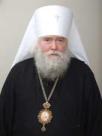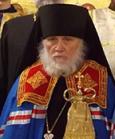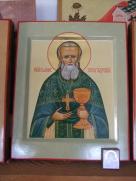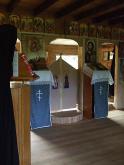Friday, September 5, 2014
Orthodox family life: A beautiful memory
 I visited an Orthodox family a few years ago. Father, mother, and four teenage children welcomed me so warmly that I felt I had become a part of their close-knit family. It seemed the word “stranger” did not exist for them. There was no awkwardness in their conversation, no pretense or vain show-off - instead, there was endless warmth and love. We conversed on topics of common interest. The lampadka remained lit in the corner of the room, where there were many icons and an analogion with books.
I visited an Orthodox family a few years ago. Father, mother, and four teenage children welcomed me so warmly that I felt I had become a part of their close-knit family. It seemed the word “stranger” did not exist for them. There was no awkwardness in their conversation, no pretense or vain show-off - instead, there was endless warmth and love. We conversed on topics of common interest. The lampadka remained lit in the corner of the room, where there were many icons and an analogion with books.
In the evening, the father suddenly said: “Prayers”! One of the daughters immediately ran to the various rooms to fetch her siblings. One by one they came wandering into the common room, while the father started:
Through the prayers of our holy fathers, Lord Jesus Christ our God, have mercy on us! Glory to Thee o God, glory to Thee….O Heavenly King, Comforter, Spirit of Truth, Who art everywhere present and fillest all things…
Soon one of the girls took over. Mother had piously covered her head with a scarf. The youngest girl ended the evening prayers, and then the family broke out in song with the troparions to all their patron saints and the saint of their parish church. They were not great singers, but they knew all the words - speaking to the saints as to their extended family!
After these ten minutes, all quickly helped prepare an evening snack, over which we continued our conversations. The girls soon wandered off to their rooms to continue their girls’ activities and their homework, perhaps? School morning tomorrow…!
![]() To my astonishment, at six o’clock in the morning, the scene repeated itself. “Prayers! Come on, get up”, I could hear not far away from the guest room. A few minutes later, three girls, mother and father, and myself, still half-asleep, stood in front of the icons, and mother now started the prayers. The readers alternated, each knowing when it was her turn. The youngest daughter finally wandered in, still in her pyjamas…
To my astonishment, at six o’clock in the morning, the scene repeated itself. “Prayers! Come on, get up”, I could hear not far away from the guest room. A few minutes later, three girls, mother and father, and myself, still half-asleep, stood in front of the icons, and mother now started the prayers. The readers alternated, each knowing when it was her turn. The youngest daughter finally wandered in, still in her pyjamas…
Prayers were nearly finished. Father announced: “Reading from the Epistle of St Paul to the Corinthians!” and we listened to the Epistle and the Gospel readings for the day. The entire session took only 15 minutes - the readers knew these prayers, and had no need to go slow…
Father rushed off to work. I shared breakfast with more or less awake and enthusiastic children. One of the oldest turned to me to explain:
“It’s because our dad lived in a monastery for a while when he was young - we live sort of like in a monastery, with prayers every day. But we are used to it, I actually like it and can’t imagine living in a different way”
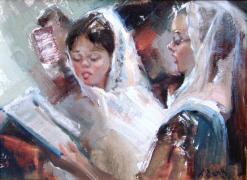 How blessed Orthodox family life can be!
How blessed Orthodox family life can be!
On Saturday night, we all went to church together for the evening service. The girls sang. Everyone had Confession. They then asked forgiveness of each other, for any unintended hurts that might have occurred.
Next morning, there were no common prayers at home, as all were off to church. The girls ran in and out of each others’ rooms, asking to borrow such-and-such a skirt and “the blue silk scarf, because it is a day for the Mother of God!”. We arrived at church nearly on time…
Time proved that this way of life was neither without fruit nor a forced exercise. All the children remained close to the Church, and they converted their future spouses to the holy Orthodox faith. They were used to fasts and feasts, prayer in Church and at home, and the Mysteries accompanying every important moment of their lives.
More on the place of the icon corner in an Orthodox home.
Tuesday, August 26, 2014
St Maximus the Confessor (7th century): Four Hundred Chapters on LOVE
![]() St Maximus describes the conduct of one who loves God:
St Maximus describes the conduct of one who loves God:
The one who loves God leads an angelic life on earth, fasting and being watchful and singing psalms and praying and always thinking good of everyone.1:42
Do not tolerate suspicions or people that would be occasions of scandal for you against anyone. For those who take scandal in any way from things which happen, intentionally or unintentionally, do not know the way of peace, which through love brings those who long for it to the knowledge of God.1:69
Regarding the inevitable clashes that occur between people, he says:
Even if in temptation your brother should insist on speaking ill of you, you should not be swept away from your charitable disposition and allow the same wicked demon to upset your mind. But you will not be swept away from it if you bless when being reviled, keep silent when spoken ill of, and remain friendly when being conspired against. This is the way of Christ’s wisdom, and the one who will not take it is not in His company.4:30
The saint, who suffered much for the true Orthodox faith, even to the point of having his tongue cut out by the emperor because of his uncompromising stand in matters of faith, teaches regarding suffering:
A person definitely wants to be healed if he does not put up any resistance to the healing remedies: These are the pains and hurts brought on by many different circumstances. The one who resists does not know what is being worked out here nor what advantage he would draw from it when he leaves this world.3:82
Sunday, August 24, 2014
Pilgrimage to the Holy Land
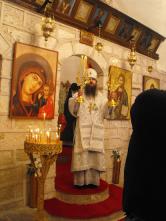 Archbishop Sophrony of St Petersburg invites people to join his pilgrimage to the Holy Land from December 1st-15th. Guided tours will be in Russian, and for those comfortable with the language, this is a wonderful opportunity to meet another of the Bishops of our Church. The group will also visit the parish of the Annunciation in the Nazareth, which is a part of ROCA.
Archbishop Sophrony of St Petersburg invites people to join his pilgrimage to the Holy Land from December 1st-15th. Guided tours will be in Russian, and for those comfortable with the language, this is a wonderful opportunity to meet another of the Bishops of our Church. The group will also visit the parish of the Annunciation in the Nazareth, which is a part of ROCA.
Vladika Sophrony wrote after his previous pilgrimage:
Jerusalem, Jerusalem, Jerusalem … I once thought that Jerusalem would remain an impossible dream for me.
My acquaintance with the great shrines began at Nazareth, with the church of the Annunciation and the place where the brothers Zebedee once lived (Apostles John and James). Next, I went to Jerusalem, meeting Patriarch Irineos, who is under house arrest. We visited the mountain monastery of St George the Chozebite.Next - the Jordan the monastery of St. Gerasimos of Jordan, where the holy family stopped in their flight from Herod. From the Mount of Temptation one can see the entire world which “lies in evil” - which the devil once offered to the God-man. At early liturgy in the church of the Nativity I saw where the Creator of the universe found refuge in a very narrow cave. The Judean Desert…Climb high into the mountains. Here the venerable Savvas founded the monastery with a strict rule prohibiting entrance for women. The monastery of St Theodosius. Here are the relics of St Euphrosyne of Polotsk. In the caves of this monastery the prophet Isaiah and King David hid. The Magi stayed here on their way back to their country after worshipping the Divine Infant Jesus.
The Lord allowed me to visit many other holy places connected with the earthly life and preaching of our Saviour Jesus Christ and the Blessed Virgin. We visited Hebron and the Oak of Mambre, which, unfortunately, does not uplift us with its greens. The field of the Shepherds, the Monastery of St. George, the Mount of Olives, the Church of St Mary Magdalene, where lie the relics of the venerable martyrs Grand Duchess Elizabeth and Nun Barbara. We followed the earthly footsteps of St John the Baptist, visited the temple of Protomartyr Stephen, the church of St Simeon, Capernaum, the site of the execution of the Sebaste martyrs, the cave in which St Nicholas laboured; We were at the well of patriarch Jacob; venerated the tomb of the Virgin Mary, the righteous Ancestors of God Joachim and Anna, and St Joseph the Betrothed, and also followed the path of our Lord and Saviour’s passion on His way to Golgotha. Freely paraphrased from Vladika Sophrony’s blog.
Those interested should contact Vladika Sophrony directly for more information and registration: email: vishegorod@inbox.ru or telephone +7 921 115 49 93. The cost of the pilgrimage is approximately USD1000, excluding airfares to Tel Aviv. See also the St Petersburg Diocese.
For those not fluent in Russian, it will possible to join future pilgrimage groups from our own Australian Diocese and from America. These will be announced in due course.
Thursday, August 21, 2014
From the Philokalia on FASTING
Suppose you have ordered yourself not to eat fish: you will find that the enemy continually makes you long to eat it. You are filled with an uncontrollable desire for the thing that is forbidden. In this way you can see how Adam’s fall typifies what happens to all of us. Because he was told not to eat from a particular tree, he felt irresistibly attracted to the one thing that was forbidden for him.
St John of Karpathos (7th century)
Those pursuing the spiritual way should train themselves to hate all uncontrolled desires until this hatred becomes habitual. With regard to self-control in eating, we must never feel loathing for any kind of food, for to do so is abominable and utterly demonic. It is emphatically not because any kind of food is bad in itself that we refrain from it. But by not eating too much or too richly we can to some extent keep in check the excitable parts of our body. In addition we can give to the poor what remains over, for this is the mark of sincere love.
Fasting, while of value in itself, is not something to boast of in front of God, for it is simply a tool for training those who desire self-restraint. The ascetic should not feel proud because he fasts; but with faith in God he should think only of reaching his goal. For no artist ever boasts that his accomplishment is simply due to his tools; but he waits for the work itself to give proof of his skill.
St Didachos of Photiki (5th century)
Friday, August 15, 2014
From the Philokalia on FASTING and SPEECH
Some are most careful about the food they take in but negligent about the words they give out. To adapt Ecclesiastes (11:10), such men do not know how to remove anger from the heart or desire from the flesh. Only through the removal of these things is a pure heart established within us by the renewing Spirit.
You can achieve frugality by lowering the quantity of your food, and sinlessness in speech by raising the quality of your silence.
The ascetic must know when and by means of what food to treat the body as an enemy, when to encourage it as a friend, and when to succour it as an invalid. Otherwise he may unwittingly offer to the friend what is proper for the enemy, or to the enemy what is proper for the friend, and to the invalid what is proper for either of the other two, and having alienated all three he may find them fighting against him in time of temptation.
If, when eating, the nourishment in your food is more important to you than its savour, then the grace of tears will be given to you and you will begin to find spiritual refreshment; and you will forget all other taste, relishing its sweetness beyond that of anything else.
Ilias the Priest (? 6-7th century)
Sunday, August 10, 2014
Odigitria Icon of the Most-Holy Mother of God
Reverence for the Mother of God and reverence for icons painted of Her and the Saints keeps Orthodox Christians safe from several of the early heresies.
Naturally, we must all learn much more about our holy Orthodox faith than this simple reverence. However, without this reverence, we will lose Orthodoxy completely…! Simple reverence is not at all contradictory to profound theological knowledge, as some modern people mistakenly assert. However, each Christian must grow to deepen this reverence, learning from Holy Scripture, the Lives of Saints, the writings of the Holy Fathers of the Church, the liturgical services of the Church (such as today’s service, for the 28th of July - the Hodigitria (Smolensk) Icon of the Mother of God).
Finally, a Christian also learns from his own relationship to the Mother of God, seeing how She has helped him in his own life. Why is this “personal lesson” last? This is because our personal experiences and thoughts always are in danger of containing some element of temptation from the evil one.
A conscientious Orthodox Christian discusses his ideas regarding the Mother of God and assistance from the saints with his father confessor. Learning from his spiritual father, humbly revealing his ideas, thoughts, and even emotions, he can remain safe from another great danger - that of self-deception and delusion. The Mystery of Confession provides a setting for a faithful person to learn in this individual manner, assisted by the grace of God and the priest as a witness.
The Church is a spiritual school. Its program of study is primarily the liturgical services, which are rich in dogmatic theology. The services satisfy the intellectual aspect of a person and encourages growth in wonder before the greatness of God. The Church also guides and nourishes a person through the Mysteries - for the greater part of our life, the great nourishing mysteries are Confession, Holy Communion and Marriage.
Paradoxically, if a person chooses to not continue his spiritual learning within the walls of the school of the Church, simple reverence without spiritual knowledge can even lead him away from God….! He may not even notice this himself. This is why the fathers have stated: “Whoever does not have the Church as a Mother, cannot have God as his Father!”
Monday, August 4, 2014
From the Philokalia on THOUGHTS
Both mental converse with evil thoughts and external encounters and chatter alike darken the soul. If we are not to injure the intellect, we must not spare either of these chatterboxes, whether they be our own thoughts or other people. And we must not spare them for a most cogent reason: because otherwise our intellect will be darkened and we will lose our watchfulness. If we are darkened by forgetfulness, we destroy the intellect.
St Hesychios the Priest, 8th Cent.
Now what am I to say about the demon who makes the soul obtuse? For I am afraid to write about him: how, at his approach, the soul departs from its own proper state and strips itself of reverence and the fear of God, no longer regarding sin as sin, or wickedness as wickedness; it looks on judgement and the eternal punishment of hell as mere words; it laughs at the fire which causes the earth to tremble; and, while supposedly confessing God, it has no understanding of His commandments. You may beat your breast as such a soul draws near to sin, but it takes no notice. You recite from the Scripture, yet it is wholly indifferent and will not hear. You point out its shame and disgrace among men, and it ignores you, like a pig that closes its eyes and charges through a fence. This demon gets into the soul by way of long-continuing thoughts of self-esteem; and unless “those days are shortened, no flesh will be saved”(Mt. 24:22).
Evagrius the Solitary, 4th Cent.
According to the Fathers, if our inner self is watchful it can protect the outer self. But we and the demons combine in committing sins. The demons work through evil thoughts alone by forming in the intellect what fanciful pictures they wish; while we sin both inwardly through evil thoughts and outwardly through our actions. Lacking the density of physical bodies, the demons through deceitfulness and guile are purveyors of torment, both to themselves and to us, by means of evil thoughts alone. If they did not lack the density of physical bodies, they would always be sinning through outward actions as well, for their will is always disposed to ungodliness.
St Hesychios the Priest
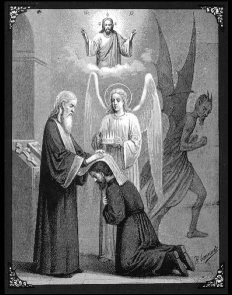 Thoughts are one way demons access our nature. We sin very much through our thoughts. Every outward sinful deed starts with a thought. Words and deeds proceed from thoughts.
Thoughts are one way demons access our nature. We sin very much through our thoughts. Every outward sinful deed starts with a thought. Words and deeds proceed from thoughts.
How ironic that modern man, investigating and claiming to know much about the physical world, has lost understanding of who instigates his own evil thoughts! He has lost the understanding that it is not obligatory to accept evil thoughts! Evil thoughts are not our own, unless we willingly accept them, or at any rate, do not reject them fully, but entertain them in our mind. No - according to the Holy Fathers of the Orthodox Church, evil thoughts are the work of our enemies, the evil spirits!
How sober and truly wise a Christian must be, to not be fooled by evil!
This is why it is so important to confess not only deeds, but also thoughts and inclinations…Confession is the main weapon of a Christian against the evil demons, whose aim is to deceive and lead all people away from God. Confession is one of the Mysteries of the Church, without which a person cannot be saved!
We need to confess often and regularly; and it is compulsory each time we are preparing to receive Holy Communion, which we should also partake of often and regularly. In our evil times, it is good practice for us Christians to do this every time we go to Church.
Friday, August 1, 2014
Holy father Seraphim, pray to God for us!
Our holy father Seraphim became a saint, filled with the Holy Spirit, by going through the steps of Christian spiritual activity.
In his childhood and youth, he lived as a pious Christian in the world. When he entered the Sarov monastery as a novice, he struggled in obedience to the Abbott and all the brothers, performing all the necessary obediences. He carried his Cross of obedient service and later, sickness, in an exemplary way, without grumbling and complaining. He denied his own will.
After this, through many years of struggle in solitude, battling with the demons and what still remained of his own sinful passions. His prayer-rule in this time was immense, and took hours every day to complete. He prayed for 1000 days and nights on a rock, regardless of the weather. He remained obedient to the Sarov monastery Abbott, even on those occasions when the Abbott and brothers did not understand his way of life.
Only after these purifying ascetic struggles did St Seraphim start to receive the people, who came to him to ask his advice and prayers.
St Seraphim gives us an example of how to struggle in Christian life: By zealously putting God before every physical comfort and even basic needs, with prayer, almsgiving, obedience, patience, humility, fasting, fighting against his body and sinful desires, enduring slander, encouraging every Christian soul with love to carry their own Cross in life with faith.
Finally, he reminds us that this struggle, in its many forms, is not the goal of our Christian life…The aim is to acquire the Holy Spirit!
Sunday, July 20, 2014
The Glorification of St John of Shanghai and San Francisco (1994)
This video is from the service of Vladyka John’s glorification in San Francisco in 1994.
Vladyka John should serve as an inspiration for us all to be zealous with respect to our faith, to live for eternity rather than for this world. Every minute of Vladyka John’s life was focused on God. God’s reality was for him more real than this life on earth.
To become a saint, we must firstly strive to fulfill all the commandments.
We must repent when we fall short in obeying God’s will, that is, when we do not live up to the law of love, the teaching of Scripture, the tradition of piety and morality of the Holy Orthodox Church. If we do not know clearly what ideal the Scriptures and the Church requires of us, this is an indication that we need to learn, that we have not yet begun a truly Christian life.
We can learn by studying the Lives of Saints, such as the life of Vladyka John - because each Saint fulfilled the Law of God in his own time and his own circumstances. We can also learn by reading the Scriptures, and the writings of the Holy Church Fathers.
By the prayers of Saint John and all our holy fathers, recent and ancient, may we turn our life to this path of pleasing God, which will lead us to true happiness, here on earth, and in eternity!
